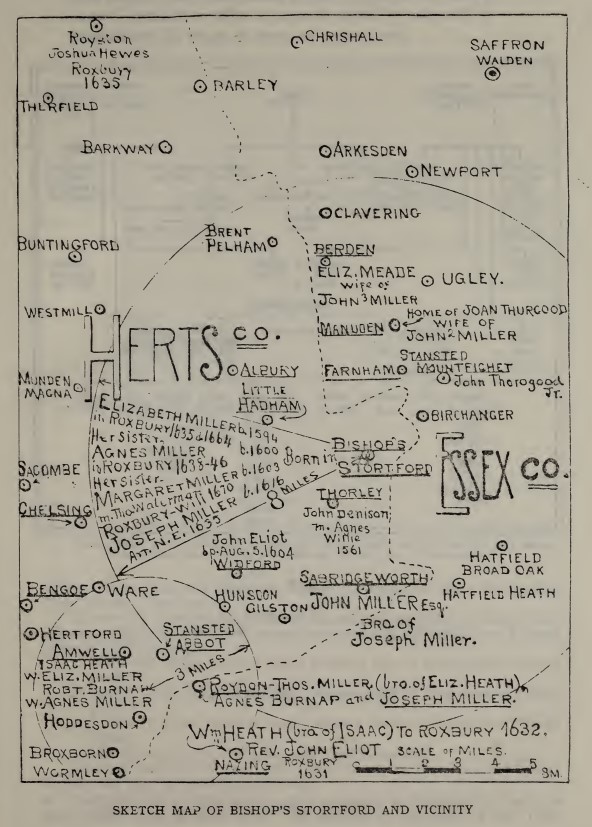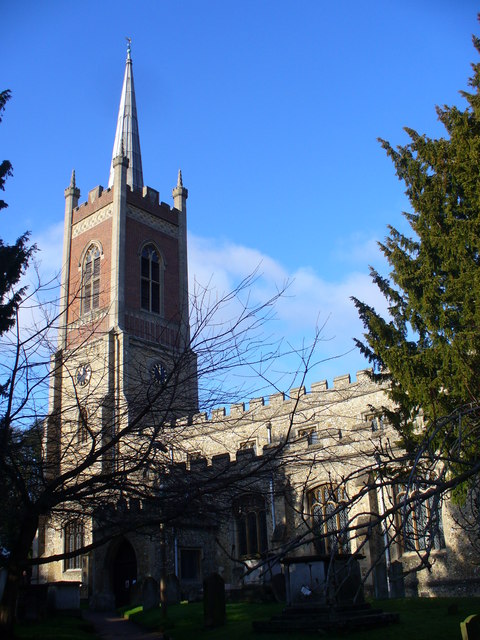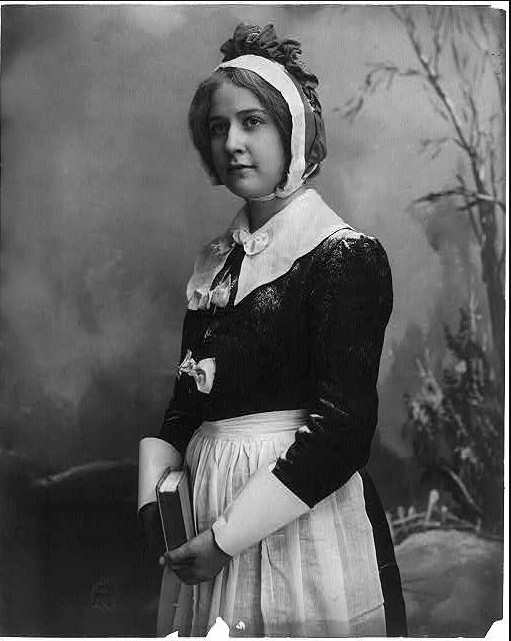
Wells Waite Miller’s direct ancestor, Thomas, came to the Colonies from England during the Great Puritan Migration in the 1630s. Initially an integral part of the community, Thomas ended up being at the center of one of its greatest scandals. How? He fathered a child with his maid, Sarah, Nettleton, while still being married to Isabel. Their child, also named Thomas, is part of Wells’ direct lineage.
Certain first names were commonly used throughout generations in the Miller family—something not especially unusual. Nor were the names repeatedly used: Thomas, John, Samuel, and Joseph for males and Margaret for females.
Thomas Miller’s Heritage
Now, here’s more about the Thomas who ended up immigrating to the Colonies while he was still living in England. Much of this was taken from The Millers of Bishops Stortford. Thomas was baptized on November 7, 1609 in St. Michael’s Church in Bishops Stortford as the youngest of eleven children born to John Miller (about 1560-October 1633) and Mary (nee Pylston) Miller. John and Mary had married on November 21, 1585; the Pylston family was a prominent one in Stortford, dating back to 1517. John had a few nicknames: “Junior” (even though his father’s name was not John!), “Long John,” and “The Elder”; the last nickname may have been given when he had a son named John.
Mary Miller apparently died before her husband with Long John Miller marrying again; this time, he married a widow named Agnes Chandler. Thomas lived with Agnes (as well as with his father) until she died in 1630 when he was twenty-one. John Miller died three years later in 1633. This is also the year that Thomas wed Isabel; a couple of years later, they added a daughter named Ann to their family.
Long John Miller’s Heritage
His father’s name was William, and he was born in 1530 with Stortford likely being his place of birth. His father’s name was John. When William was thirty-six years of age, he served as a constable and collector for the poor; for these services, he earned 4s 4d. In 1558, William gave his church 15d and, in 1560-1561, he was the church warden; for this, in 1563, he was paid 9L 15s. The professional genealogist who helped me with this English research notes that, in 2021, this amount would translate into roughly $12.69. In 1563, though, this would have covered the costs of one of these: two horses, seven cows, thirty stones of wool, ten quarters of wheat, or 325 days of a skilled tradesman’s labor.
Millers: Importance of Church

Church was an important part of life for the Miller family. William’s father and grandfather also served as church wardens in their time with generations of the family being “deacons, ministers, elders or wardens.” When referring to “church,” it means St. Michael’s Church, which was the only option in Stortford until 1662. Adults were required to attend worship services while children (grouped by age) needed to study the Bible, prayer book, and catechism in classes. Rev. Thomas Bendish led the classes until his death in 1632.
It was noted that Rev. Bendish did not appear to be anti-Puritan. This kind of intolerance ended up causing many Puritans to flee England to go to the Colonies. Within a couple of decades, though, the Puritans were the ones who did not tolerate the presence of other religions.
In The Millers of Bishops Stortford, it was described as “highly significant” that Thomas’s siblings who went to the colonies did not join the Congregational church in their new home. In other words, they weren’t Puritans.

Pro Education
The Millers apparently also felt passionate about education, donating land for schools while in England, teaching, and otherwise supporting the educational system. This pro-education stance may have been passed down the generations in the Colonies/United States as well. Wells Waite Miller, Mary Miller, and their children Amos and Corinne all received a quality education in Oberlin, Ohio, and Wells briefly taught school in Castalia, Ohio after the Civil War ended.
Leaving England
Four of Thomas Miller’s siblings left England in the 1630s, being led by Rev. John Eliot or Rev. John Norton: Joseph, Elizabeth, Margaret, and Anne (also called Agnes). Researchers have suggested that, rather than leaving to escape persecution, they left for economic reasons, which was a common reason at the time for leaving Stortford. The Miller siblings were also being “prompted by an adventurous spirit.” It appears that some of his family came to the Colonies a couple of years before Thomas did, so perhaps he left England to rejoin with family.
Wells Waite Miller: Exploration of His Life and Times
I’d like to share my research about Wells Waite Miller from Castalia, Ohio with you. Although I’ve written the material in the order in which I’ve found research material, I now roughly have the posts in the order in which the events occurred.
Blog posts I’ve written on the subject so far include:
- Wells Waite Miller’s America
- Thomas Miller: Ancestors in England (current post)
- Great Puritan Migration
- Scandal in the Colonies
- Calm in the Eye of the Storm
- Aaron Miller: Born Under the Drumbeats of War
- Grandparents, Parents, and Siblings
- Enfield, New York
- Ohio Bound
- Oberlin Years: Fierce Debates About Abolitionism
- Enlisting in the Civil War
- A Look at Lodowick G. Miller
- Captured: Camp Parole
- Marching Towards Gettysburg
- Picketts Charge and 43 Bonus Years
- Glory Days to Invalid Corps
- Castalia Massacre
- Calvin Caswell
- Calvin Caswell, Continued
- Obed Caswell And Walter Caswell: Story of Brothers
- Miller Family Mystery Solved?
- Miller Family Mystery Solved, Part Two
- Amos and Corinne Miller
- Oscar Schultz Kriebel, Part One
- Oscar Schultz Kriebel, Part Two
- Oscar Schultz Kriebel, Part Three
- Oscar Schultz Kriebel, Part Four
- Erie County, Ohio for Congress
- Wells Waite Miller: Republic Candidate for Ohio Governor
- Ohio Antietam Battlefield Commission
- “Speaking the Names: A Tale of Two Brothers” at Ashland University’s Black Fork Review
I invite you to become part of this journey, sharing my posts with people who enjoy reading historical biographies.
If you read this material and have additional information that’s directly tied to Miller or sets context about his life—or you’ve spotted errors—please email me at kbsagert@aol.com.